BUSN102 - Ethical Business Communication: Maintaining Integrity
VerifiedAdded on 2023/04/03
|6
|2163
|229
Essay
AI Summary
This essay argues for the critical importance of ethical business communication in modern organizations. It explores how ethical communication fosters a positive work culture, respects employee rights, and builds trust with clients and stakeholders. The essay addresses potential drawbacks, such as costs and privacy concerns, but concludes that the benefits of ethical communication, including enhanced employee morale and a stronger company reputation, outweigh the disadvantages. The discussion incorporates real-world examples and ethical frameworks to support its claims, emphasizing the necessity of transparency and integrity in all business communications. Desklib provides similar solved assignments and resources for students.
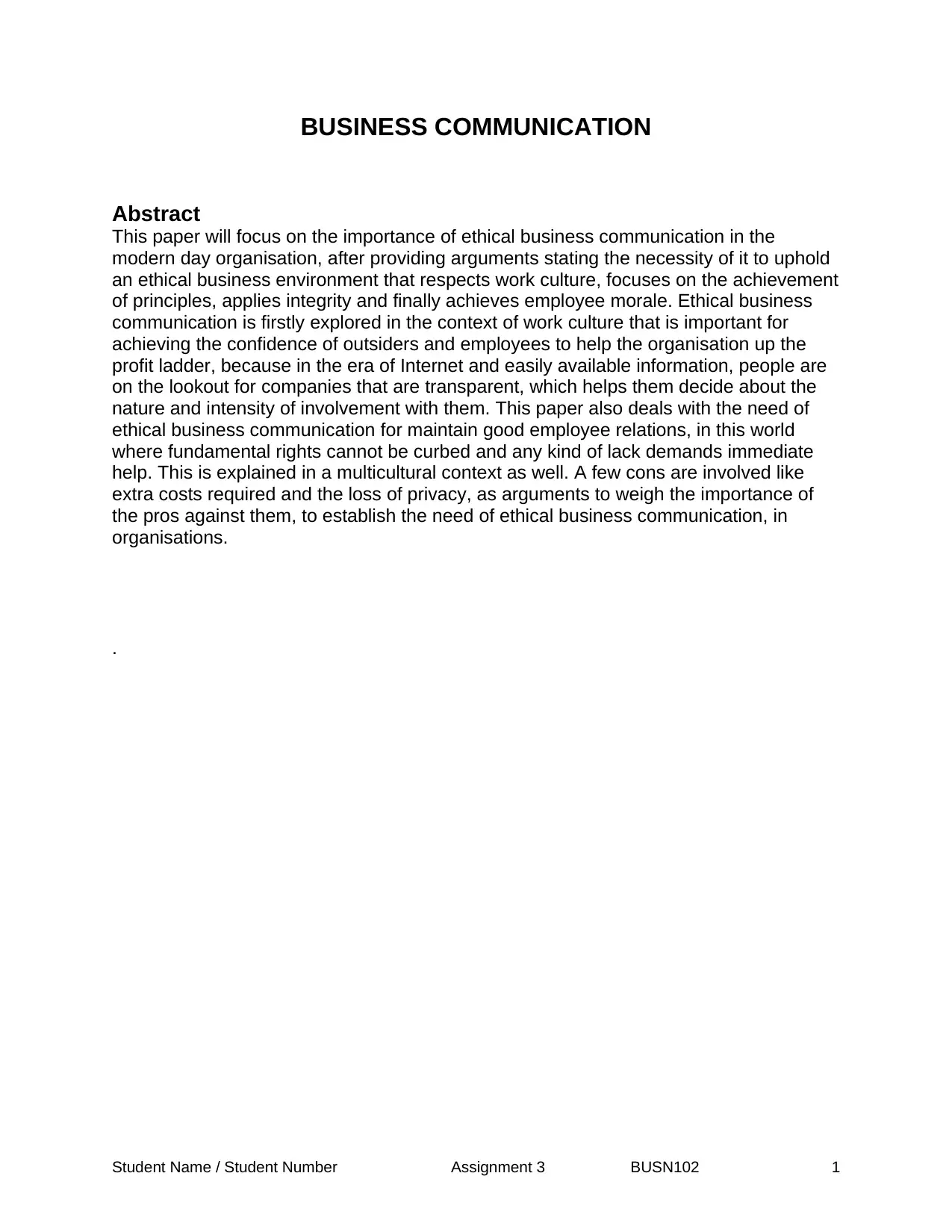
BUSINESS COMMUNICATION
Abstract
This paper will focus on the importance of ethical business communication in the
modern day organisation, after providing arguments stating the necessity of it to uphold
an ethical business environment that respects work culture, focuses on the achievement
of principles, applies integrity and finally achieves employee morale. Ethical business
communication is firstly explored in the context of work culture that is important for
achieving the confidence of outsiders and employees to help the organisation up the
profit ladder, because in the era of Internet and easily available information, people are
on the lookout for companies that are transparent, which helps them decide about the
nature and intensity of involvement with them. This paper also deals with the need of
ethical business communication for maintain good employee relations, in this world
where fundamental rights cannot be curbed and any kind of lack demands immediate
help. This is explained in a multicultural context as well. A few cons are involved like
extra costs required and the loss of privacy, as arguments to weigh the importance of
the pros against them, to establish the need of ethical business communication, in
organisations.
.
Student Name / Student Number Assignment 3 BUSN102 1
Abstract
This paper will focus on the importance of ethical business communication in the
modern day organisation, after providing arguments stating the necessity of it to uphold
an ethical business environment that respects work culture, focuses on the achievement
of principles, applies integrity and finally achieves employee morale. Ethical business
communication is firstly explored in the context of work culture that is important for
achieving the confidence of outsiders and employees to help the organisation up the
profit ladder, because in the era of Internet and easily available information, people are
on the lookout for companies that are transparent, which helps them decide about the
nature and intensity of involvement with them. This paper also deals with the need of
ethical business communication for maintain good employee relations, in this world
where fundamental rights cannot be curbed and any kind of lack demands immediate
help. This is explained in a multicultural context as well. A few cons are involved like
extra costs required and the loss of privacy, as arguments to weigh the importance of
the pros against them, to establish the need of ethical business communication, in
organisations.
.
Student Name / Student Number Assignment 3 BUSN102 1
Paraphrase This Document
Need a fresh take? Get an instant paraphrase of this document with our AI Paraphraser
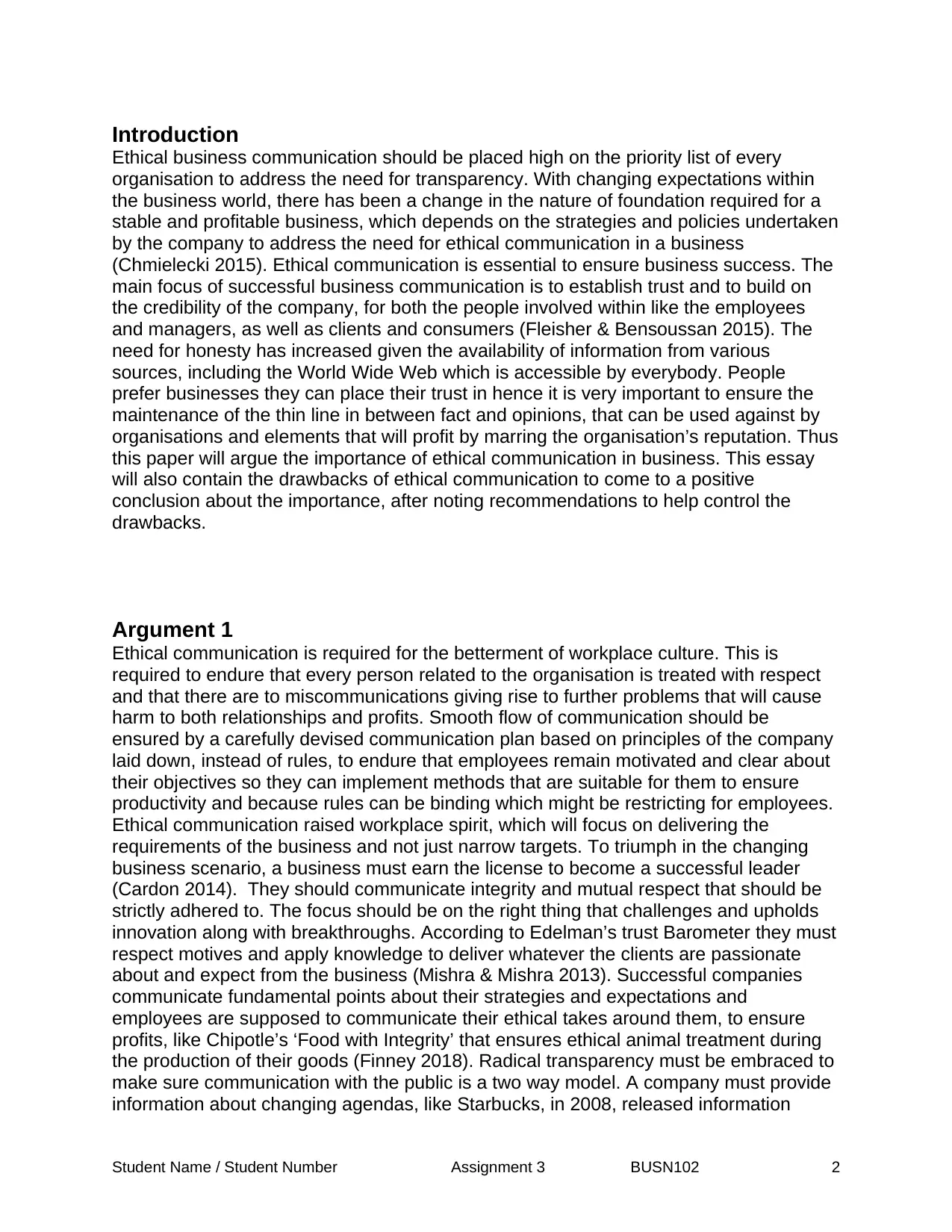
Introduction
Ethical business communication should be placed high on the priority list of every
organisation to address the need for transparency. With changing expectations within
the business world, there has been a change in the nature of foundation required for a
stable and profitable business, which depends on the strategies and policies undertaken
by the company to address the need for ethical communication in a business
(Chmielecki 2015). Ethical communication is essential to ensure business success. The
main focus of successful business communication is to establish trust and to build on
the credibility of the company, for both the people involved within like the employees
and managers, as well as clients and consumers (Fleisher & Bensoussan 2015). The
need for honesty has increased given the availability of information from various
sources, including the World Wide Web which is accessible by everybody. People
prefer businesses they can place their trust in hence it is very important to ensure the
maintenance of the thin line in between fact and opinions, that can be used against by
organisations and elements that will profit by marring the organisation’s reputation. Thus
this paper will argue the importance of ethical communication in business. This essay
will also contain the drawbacks of ethical communication to come to a positive
conclusion about the importance, after noting recommendations to help control the
drawbacks.
Argument 1
Ethical communication is required for the betterment of workplace culture. This is
required to endure that every person related to the organisation is treated with respect
and that there are to miscommunications giving rise to further problems that will cause
harm to both relationships and profits. Smooth flow of communication should be
ensured by a carefully devised communication plan based on principles of the company
laid down, instead of rules, to endure that employees remain motivated and clear about
their objectives so they can implement methods that are suitable for them to ensure
productivity and because rules can be binding which might be restricting for employees.
Ethical communication raised workplace spirit, which will focus on delivering the
requirements of the business and not just narrow targets. To triumph in the changing
business scenario, a business must earn the license to become a successful leader
(Cardon 2014). They should communicate integrity and mutual respect that should be
strictly adhered to. The focus should be on the right thing that challenges and upholds
innovation along with breakthroughs. According to Edelman’s trust Barometer they must
respect motives and apply knowledge to deliver whatever the clients are passionate
about and expect from the business (Mishra & Mishra 2013). Successful companies
communicate fundamental points about their strategies and expectations and
employees are supposed to communicate their ethical takes around them, to ensure
profits, like Chipotle’s ‘Food with Integrity’ that ensures ethical animal treatment during
the production of their goods (Finney 2018). Radical transparency must be embraced to
make sure communication with the public is a two way model. A company must provide
information about changing agendas, like Starbucks, in 2008, released information
Student Name / Student Number Assignment 3 BUSN102 2
Ethical business communication should be placed high on the priority list of every
organisation to address the need for transparency. With changing expectations within
the business world, there has been a change in the nature of foundation required for a
stable and profitable business, which depends on the strategies and policies undertaken
by the company to address the need for ethical communication in a business
(Chmielecki 2015). Ethical communication is essential to ensure business success. The
main focus of successful business communication is to establish trust and to build on
the credibility of the company, for both the people involved within like the employees
and managers, as well as clients and consumers (Fleisher & Bensoussan 2015). The
need for honesty has increased given the availability of information from various
sources, including the World Wide Web which is accessible by everybody. People
prefer businesses they can place their trust in hence it is very important to ensure the
maintenance of the thin line in between fact and opinions, that can be used against by
organisations and elements that will profit by marring the organisation’s reputation. Thus
this paper will argue the importance of ethical communication in business. This essay
will also contain the drawbacks of ethical communication to come to a positive
conclusion about the importance, after noting recommendations to help control the
drawbacks.
Argument 1
Ethical communication is required for the betterment of workplace culture. This is
required to endure that every person related to the organisation is treated with respect
and that there are to miscommunications giving rise to further problems that will cause
harm to both relationships and profits. Smooth flow of communication should be
ensured by a carefully devised communication plan based on principles of the company
laid down, instead of rules, to endure that employees remain motivated and clear about
their objectives so they can implement methods that are suitable for them to ensure
productivity and because rules can be binding which might be restricting for employees.
Ethical communication raised workplace spirit, which will focus on delivering the
requirements of the business and not just narrow targets. To triumph in the changing
business scenario, a business must earn the license to become a successful leader
(Cardon 2014). They should communicate integrity and mutual respect that should be
strictly adhered to. The focus should be on the right thing that challenges and upholds
innovation along with breakthroughs. According to Edelman’s trust Barometer they must
respect motives and apply knowledge to deliver whatever the clients are passionate
about and expect from the business (Mishra & Mishra 2013). Successful companies
communicate fundamental points about their strategies and expectations and
employees are supposed to communicate their ethical takes around them, to ensure
profits, like Chipotle’s ‘Food with Integrity’ that ensures ethical animal treatment during
the production of their goods (Finney 2018). Radical transparency must be embraced to
make sure communication with the public is a two way model. A company must provide
information about changing agendas, like Starbucks, in 2008, released information
Student Name / Student Number Assignment 3 BUSN102 2
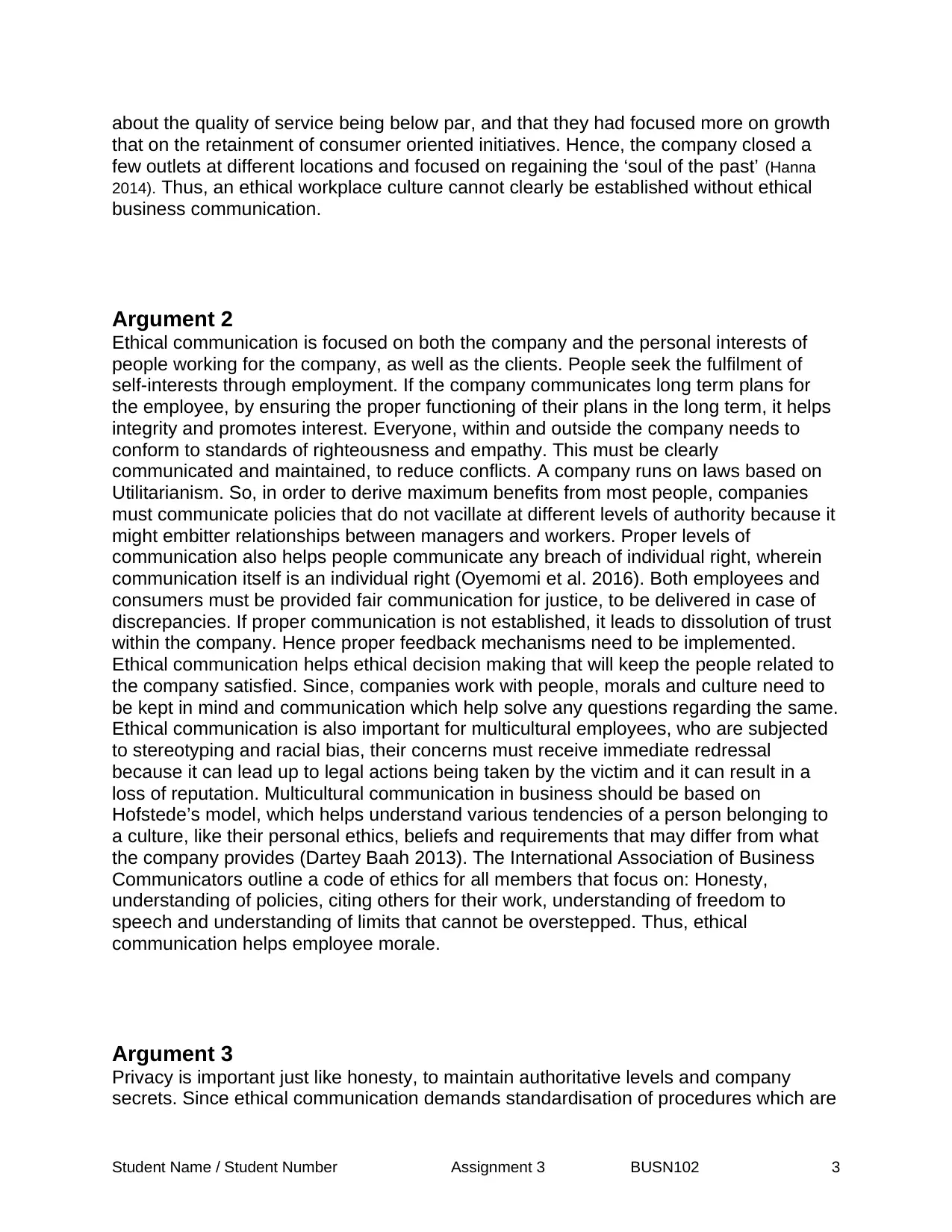
about the quality of service being below par, and that they had focused more on growth
that on the retainment of consumer oriented initiatives. Hence, the company closed a
few outlets at different locations and focused on regaining the ‘soul of the past’ (Hanna
2014). Thus, an ethical workplace culture cannot clearly be established without ethical
business communication.
Argument 2
Ethical communication is focused on both the company and the personal interests of
people working for the company, as well as the clients. People seek the fulfilment of
self-interests through employment. If the company communicates long term plans for
the employee, by ensuring the proper functioning of their plans in the long term, it helps
integrity and promotes interest. Everyone, within and outside the company needs to
conform to standards of righteousness and empathy. This must be clearly
communicated and maintained, to reduce conflicts. A company runs on laws based on
Utilitarianism. So, in order to derive maximum benefits from most people, companies
must communicate policies that do not vacillate at different levels of authority because it
might embitter relationships between managers and workers. Proper levels of
communication also helps people communicate any breach of individual right, wherein
communication itself is an individual right (Oyemomi et al. 2016). Both employees and
consumers must be provided fair communication for justice, to be delivered in case of
discrepancies. If proper communication is not established, it leads to dissolution of trust
within the company. Hence proper feedback mechanisms need to be implemented.
Ethical communication helps ethical decision making that will keep the people related to
the company satisfied. Since, companies work with people, morals and culture need to
be kept in mind and communication which help solve any questions regarding the same.
Ethical communication is also important for multicultural employees, who are subjected
to stereotyping and racial bias, their concerns must receive immediate redressal
because it can lead up to legal actions being taken by the victim and it can result in a
loss of reputation. Multicultural communication in business should be based on
Hofstede’s model, which helps understand various tendencies of a person belonging to
a culture, like their personal ethics, beliefs and requirements that may differ from what
the company provides (Dartey Baah 2013). The International Association of Business
Communicators outline a code of ethics for all members that focus on: Honesty,
understanding of policies, citing others for their work, understanding of freedom to
speech and understanding of limits that cannot be overstepped. Thus, ethical
communication helps employee morale.
Argument 3
Privacy is important just like honesty, to maintain authoritative levels and company
secrets. Since ethical communication demands standardisation of procedures which are
Student Name / Student Number Assignment 3 BUSN102 3
that on the retainment of consumer oriented initiatives. Hence, the company closed a
few outlets at different locations and focused on regaining the ‘soul of the past’ (Hanna
2014). Thus, an ethical workplace culture cannot clearly be established without ethical
business communication.
Argument 2
Ethical communication is focused on both the company and the personal interests of
people working for the company, as well as the clients. People seek the fulfilment of
self-interests through employment. If the company communicates long term plans for
the employee, by ensuring the proper functioning of their plans in the long term, it helps
integrity and promotes interest. Everyone, within and outside the company needs to
conform to standards of righteousness and empathy. This must be clearly
communicated and maintained, to reduce conflicts. A company runs on laws based on
Utilitarianism. So, in order to derive maximum benefits from most people, companies
must communicate policies that do not vacillate at different levels of authority because it
might embitter relationships between managers and workers. Proper levels of
communication also helps people communicate any breach of individual right, wherein
communication itself is an individual right (Oyemomi et al. 2016). Both employees and
consumers must be provided fair communication for justice, to be delivered in case of
discrepancies. If proper communication is not established, it leads to dissolution of trust
within the company. Hence proper feedback mechanisms need to be implemented.
Ethical communication helps ethical decision making that will keep the people related to
the company satisfied. Since, companies work with people, morals and culture need to
be kept in mind and communication which help solve any questions regarding the same.
Ethical communication is also important for multicultural employees, who are subjected
to stereotyping and racial bias, their concerns must receive immediate redressal
because it can lead up to legal actions being taken by the victim and it can result in a
loss of reputation. Multicultural communication in business should be based on
Hofstede’s model, which helps understand various tendencies of a person belonging to
a culture, like their personal ethics, beliefs and requirements that may differ from what
the company provides (Dartey Baah 2013). The International Association of Business
Communicators outline a code of ethics for all members that focus on: Honesty,
understanding of policies, citing others for their work, understanding of freedom to
speech and understanding of limits that cannot be overstepped. Thus, ethical
communication helps employee morale.
Argument 3
Privacy is important just like honesty, to maintain authoritative levels and company
secrets. Since ethical communication demands standardisation of procedures which are
Student Name / Student Number Assignment 3 BUSN102 3
⊘ This is a preview!⊘
Do you want full access?
Subscribe today to unlock all pages.

Trusted by 1+ million students worldwide
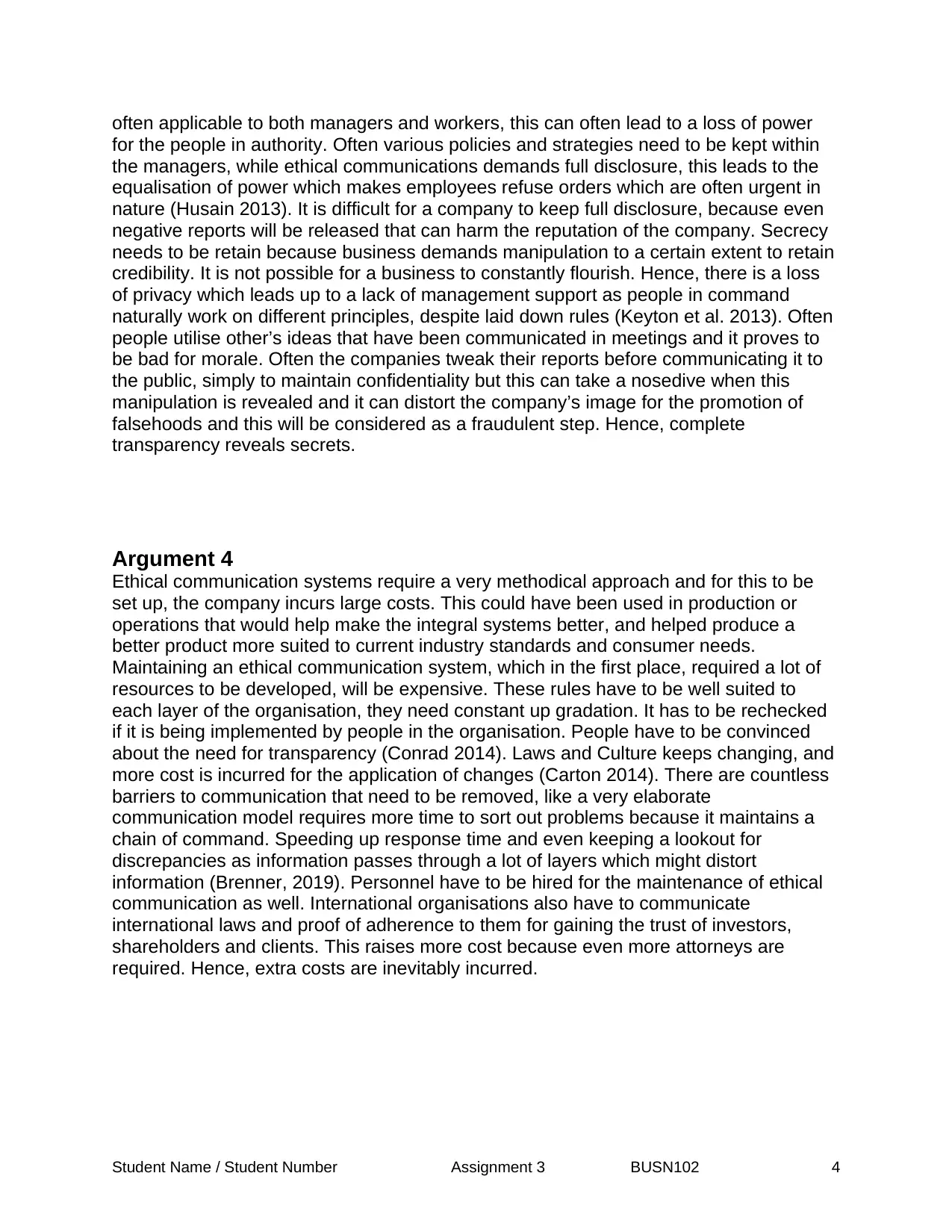
often applicable to both managers and workers, this can often lead to a loss of power
for the people in authority. Often various policies and strategies need to be kept within
the managers, while ethical communications demands full disclosure, this leads to the
equalisation of power which makes employees refuse orders which are often urgent in
nature (Husain 2013). It is difficult for a company to keep full disclosure, because even
negative reports will be released that can harm the reputation of the company. Secrecy
needs to be retain because business demands manipulation to a certain extent to retain
credibility. It is not possible for a business to constantly flourish. Hence, there is a loss
of privacy which leads up to a lack of management support as people in command
naturally work on different principles, despite laid down rules (Keyton et al. 2013). Often
people utilise other’s ideas that have been communicated in meetings and it proves to
be bad for morale. Often the companies tweak their reports before communicating it to
the public, simply to maintain confidentiality but this can take a nosedive when this
manipulation is revealed and it can distort the company’s image for the promotion of
falsehoods and this will be considered as a fraudulent step. Hence, complete
transparency reveals secrets.
Argument 4
Ethical communication systems require a very methodical approach and for this to be
set up, the company incurs large costs. This could have been used in production or
operations that would help make the integral systems better, and helped produce a
better product more suited to current industry standards and consumer needs.
Maintaining an ethical communication system, which in the first place, required a lot of
resources to be developed, will be expensive. These rules have to be well suited to
each layer of the organisation, they need constant up gradation. It has to be rechecked
if it is being implemented by people in the organisation. People have to be convinced
about the need for transparency (Conrad 2014). Laws and Culture keeps changing, and
more cost is incurred for the application of changes (Carton 2014). There are countless
barriers to communication that need to be removed, like a very elaborate
communication model requires more time to sort out problems because it maintains a
chain of command. Speeding up response time and even keeping a lookout for
discrepancies as information passes through a lot of layers which might distort
information (Brenner, 2019). Personnel have to be hired for the maintenance of ethical
communication as well. International organisations also have to communicate
international laws and proof of adherence to them for gaining the trust of investors,
shareholders and clients. This raises more cost because even more attorneys are
required. Hence, extra costs are inevitably incurred.
Student Name / Student Number Assignment 3 BUSN102 4
for the people in authority. Often various policies and strategies need to be kept within
the managers, while ethical communications demands full disclosure, this leads to the
equalisation of power which makes employees refuse orders which are often urgent in
nature (Husain 2013). It is difficult for a company to keep full disclosure, because even
negative reports will be released that can harm the reputation of the company. Secrecy
needs to be retain because business demands manipulation to a certain extent to retain
credibility. It is not possible for a business to constantly flourish. Hence, there is a loss
of privacy which leads up to a lack of management support as people in command
naturally work on different principles, despite laid down rules (Keyton et al. 2013). Often
people utilise other’s ideas that have been communicated in meetings and it proves to
be bad for morale. Often the companies tweak their reports before communicating it to
the public, simply to maintain confidentiality but this can take a nosedive when this
manipulation is revealed and it can distort the company’s image for the promotion of
falsehoods and this will be considered as a fraudulent step. Hence, complete
transparency reveals secrets.
Argument 4
Ethical communication systems require a very methodical approach and for this to be
set up, the company incurs large costs. This could have been used in production or
operations that would help make the integral systems better, and helped produce a
better product more suited to current industry standards and consumer needs.
Maintaining an ethical communication system, which in the first place, required a lot of
resources to be developed, will be expensive. These rules have to be well suited to
each layer of the organisation, they need constant up gradation. It has to be rechecked
if it is being implemented by people in the organisation. People have to be convinced
about the need for transparency (Conrad 2014). Laws and Culture keeps changing, and
more cost is incurred for the application of changes (Carton 2014). There are countless
barriers to communication that need to be removed, like a very elaborate
communication model requires more time to sort out problems because it maintains a
chain of command. Speeding up response time and even keeping a lookout for
discrepancies as information passes through a lot of layers which might distort
information (Brenner, 2019). Personnel have to be hired for the maintenance of ethical
communication as well. International organisations also have to communicate
international laws and proof of adherence to them for gaining the trust of investors,
shareholders and clients. This raises more cost because even more attorneys are
required. Hence, extra costs are inevitably incurred.
Student Name / Student Number Assignment 3 BUSN102 4
Paraphrase This Document
Need a fresh take? Get an instant paraphrase of this document with our AI Paraphraser
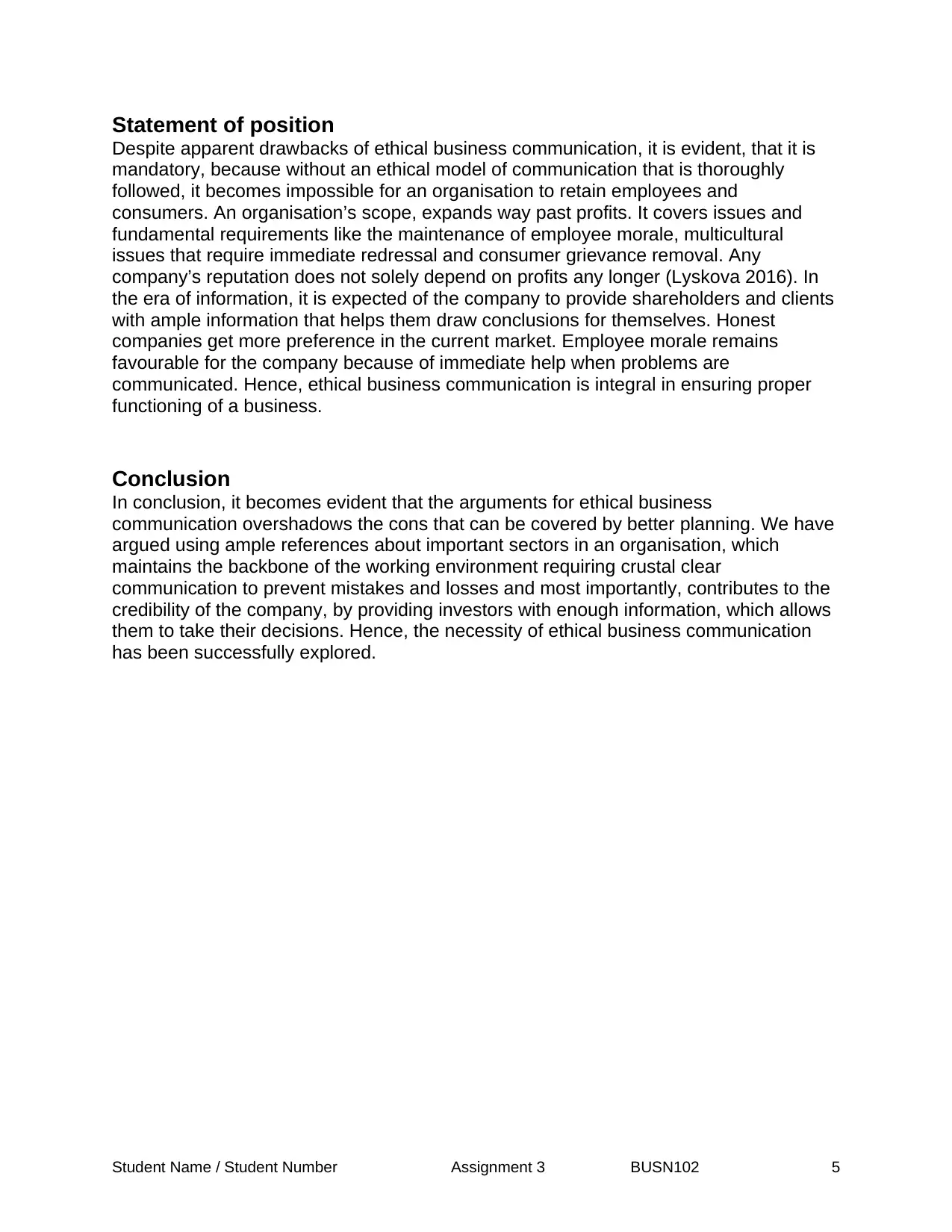
Statement of position
Despite apparent drawbacks of ethical business communication, it is evident, that it is
mandatory, because without an ethical model of communication that is thoroughly
followed, it becomes impossible for an organisation to retain employees and
consumers. An organisation’s scope, expands way past profits. It covers issues and
fundamental requirements like the maintenance of employee morale, multicultural
issues that require immediate redressal and consumer grievance removal. Any
company’s reputation does not solely depend on profits any longer (Lyskova 2016). In
the era of information, it is expected of the company to provide shareholders and clients
with ample information that helps them draw conclusions for themselves. Honest
companies get more preference in the current market. Employee morale remains
favourable for the company because of immediate help when problems are
communicated. Hence, ethical business communication is integral in ensuring proper
functioning of a business.
Conclusion
In conclusion, it becomes evident that the arguments for ethical business
communication overshadows the cons that can be covered by better planning. We have
argued using ample references about important sectors in an organisation, which
maintains the backbone of the working environment requiring crustal clear
communication to prevent mistakes and losses and most importantly, contributes to the
credibility of the company, by providing investors with enough information, which allows
them to take their decisions. Hence, the necessity of ethical business communication
has been successfully explored.
Student Name / Student Number Assignment 3 BUSN102 5
Despite apparent drawbacks of ethical business communication, it is evident, that it is
mandatory, because without an ethical model of communication that is thoroughly
followed, it becomes impossible for an organisation to retain employees and
consumers. An organisation’s scope, expands way past profits. It covers issues and
fundamental requirements like the maintenance of employee morale, multicultural
issues that require immediate redressal and consumer grievance removal. Any
company’s reputation does not solely depend on profits any longer (Lyskova 2016). In
the era of information, it is expected of the company to provide shareholders and clients
with ample information that helps them draw conclusions for themselves. Honest
companies get more preference in the current market. Employee morale remains
favourable for the company because of immediate help when problems are
communicated. Hence, ethical business communication is integral in ensuring proper
functioning of a business.
Conclusion
In conclusion, it becomes evident that the arguments for ethical business
communication overshadows the cons that can be covered by better planning. We have
argued using ample references about important sectors in an organisation, which
maintains the backbone of the working environment requiring crustal clear
communication to prevent mistakes and losses and most importantly, contributes to the
credibility of the company, by providing investors with enough information, which allows
them to take their decisions. Hence, the necessity of ethical business communication
has been successfully explored.
Student Name / Student Number Assignment 3 BUSN102 5
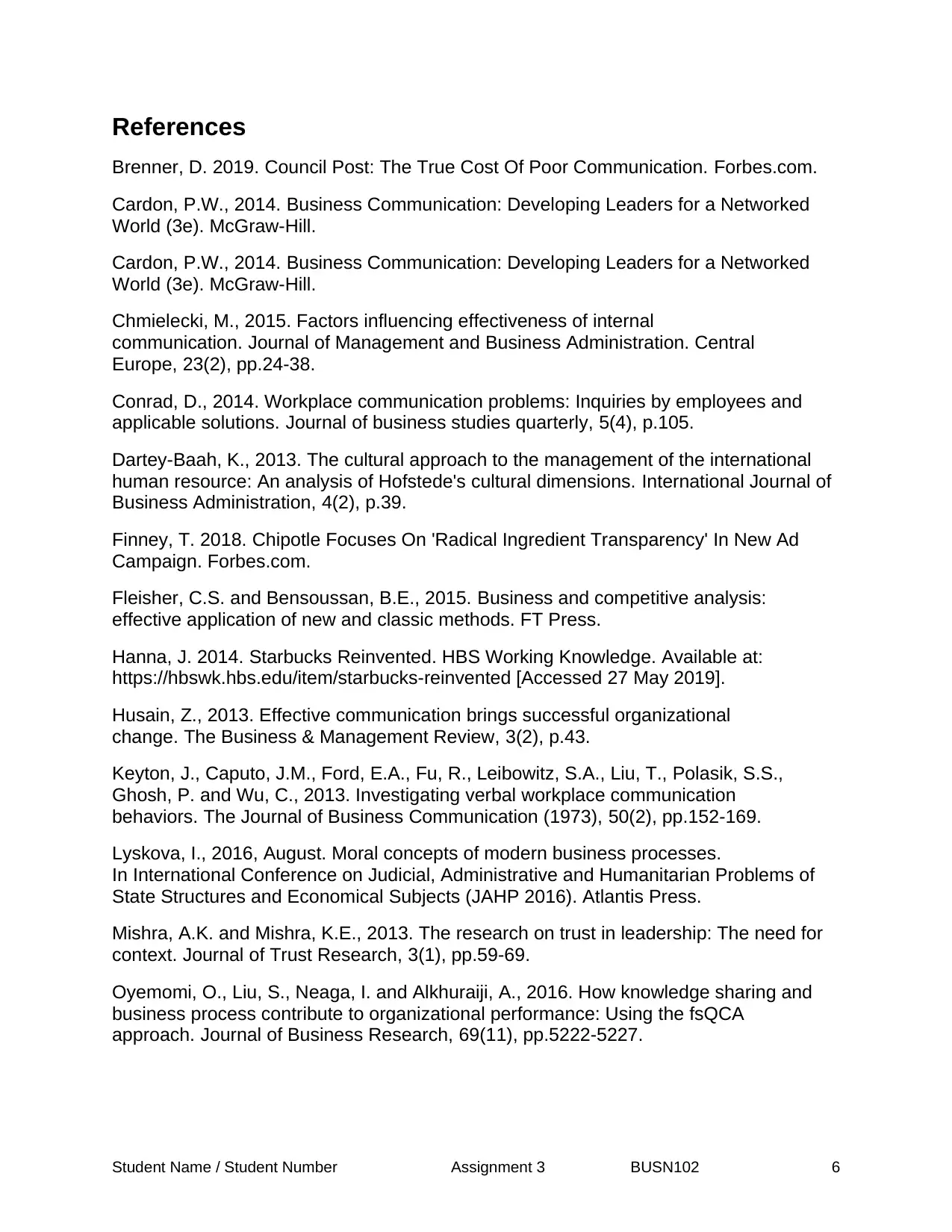
References
Brenner, D. 2019. Council Post: The True Cost Of Poor Communication. Forbes.com.
Cardon, P.W., 2014. Business Communication: Developing Leaders for a Networked
World (3e). McGraw-Hill.
Cardon, P.W., 2014. Business Communication: Developing Leaders for a Networked
World (3e). McGraw-Hill.
Chmielecki, M., 2015. Factors influencing effectiveness of internal
communication. Journal of Management and Business Administration. Central
Europe, 23(2), pp.24-38.
Conrad, D., 2014. Workplace communication problems: Inquiries by employees and
applicable solutions. Journal of business studies quarterly, 5(4), p.105.
Dartey-Baah, K., 2013. The cultural approach to the management of the international
human resource: An analysis of Hofstede's cultural dimensions. International Journal of
Business Administration, 4(2), p.39.
Finney, T. 2018. Chipotle Focuses On 'Radical Ingredient Transparency' In New Ad
Campaign. Forbes.com.
Fleisher, C.S. and Bensoussan, B.E., 2015. Business and competitive analysis:
effective application of new and classic methods. FT Press.
Hanna, J. 2014. Starbucks Reinvented. HBS Working Knowledge. Available at:
https://hbswk.hbs.edu/item/starbucks-reinvented [Accessed 27 May 2019].
Husain, Z., 2013. Effective communication brings successful organizational
change. The Business & Management Review, 3(2), p.43.
Keyton, J., Caputo, J.M., Ford, E.A., Fu, R., Leibowitz, S.A., Liu, T., Polasik, S.S.,
Ghosh, P. and Wu, C., 2013. Investigating verbal workplace communication
behaviors. The Journal of Business Communication (1973), 50(2), pp.152-169.
Lyskova, I., 2016, August. Moral concepts of modern business processes.
In International Conference on Judicial, Administrative and Humanitarian Problems of
State Structures and Economical Subjects (JAHP 2016). Atlantis Press.
Mishra, A.K. and Mishra, K.E., 2013. The research on trust in leadership: The need for
context. Journal of Trust Research, 3(1), pp.59-69.
Oyemomi, O., Liu, S., Neaga, I. and Alkhuraiji, A., 2016. How knowledge sharing and
business process contribute to organizational performance: Using the fsQCA
approach. Journal of Business Research, 69(11), pp.5222-5227.
Student Name / Student Number Assignment 3 BUSN102 6
Brenner, D. 2019. Council Post: The True Cost Of Poor Communication. Forbes.com.
Cardon, P.W., 2014. Business Communication: Developing Leaders for a Networked
World (3e). McGraw-Hill.
Cardon, P.W., 2014. Business Communication: Developing Leaders for a Networked
World (3e). McGraw-Hill.
Chmielecki, M., 2015. Factors influencing effectiveness of internal
communication. Journal of Management and Business Administration. Central
Europe, 23(2), pp.24-38.
Conrad, D., 2014. Workplace communication problems: Inquiries by employees and
applicable solutions. Journal of business studies quarterly, 5(4), p.105.
Dartey-Baah, K., 2013. The cultural approach to the management of the international
human resource: An analysis of Hofstede's cultural dimensions. International Journal of
Business Administration, 4(2), p.39.
Finney, T. 2018. Chipotle Focuses On 'Radical Ingredient Transparency' In New Ad
Campaign. Forbes.com.
Fleisher, C.S. and Bensoussan, B.E., 2015. Business and competitive analysis:
effective application of new and classic methods. FT Press.
Hanna, J. 2014. Starbucks Reinvented. HBS Working Knowledge. Available at:
https://hbswk.hbs.edu/item/starbucks-reinvented [Accessed 27 May 2019].
Husain, Z., 2013. Effective communication brings successful organizational
change. The Business & Management Review, 3(2), p.43.
Keyton, J., Caputo, J.M., Ford, E.A., Fu, R., Leibowitz, S.A., Liu, T., Polasik, S.S.,
Ghosh, P. and Wu, C., 2013. Investigating verbal workplace communication
behaviors. The Journal of Business Communication (1973), 50(2), pp.152-169.
Lyskova, I., 2016, August. Moral concepts of modern business processes.
In International Conference on Judicial, Administrative and Humanitarian Problems of
State Structures and Economical Subjects (JAHP 2016). Atlantis Press.
Mishra, A.K. and Mishra, K.E., 2013. The research on trust in leadership: The need for
context. Journal of Trust Research, 3(1), pp.59-69.
Oyemomi, O., Liu, S., Neaga, I. and Alkhuraiji, A., 2016. How knowledge sharing and
business process contribute to organizational performance: Using the fsQCA
approach. Journal of Business Research, 69(11), pp.5222-5227.
Student Name / Student Number Assignment 3 BUSN102 6
⊘ This is a preview!⊘
Do you want full access?
Subscribe today to unlock all pages.

Trusted by 1+ million students worldwide
1 out of 6
Related Documents
Your All-in-One AI-Powered Toolkit for Academic Success.
+13062052269
info@desklib.com
Available 24*7 on WhatsApp / Email
![[object Object]](/_next/static/media/star-bottom.7253800d.svg)
Unlock your academic potential
Copyright © 2020–2025 A2Z Services. All Rights Reserved. Developed and managed by ZUCOL.



